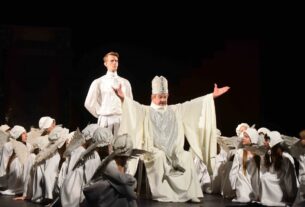László Lator, poet, literary translator, essayist and teacher, has died at the age of 95 – writes Könyves Magazin. The news was confirmed to MTI by the Széchenyi Academy of Literature and Arts.
The Kossuth Prize-winning Hungarian poet, literary translator, essayist, teacher and founding member of the Digital Academy of Literature was born in 1927 in Tiszasásvár. He started to write poetry as a very young child, his father gave him László Négyesy’s Hungarian verse-stanza, from which he learned what forms of poetry exist. His first poems were published in the children’s supplement of the Prague Hungarian Newspaper, then in various student magazines, and later in Magyarok and Válasz.
In 1943, during the Second World War, he was called up as a soldier and was taken prisoner of war, first by the Americans and then by the Soviets, to the Brest-Litovsk prison camp. In 1945 he returned to his birthplace, which was then part of the Soviet Union, and from there he was lucky enough to escape to Hungary and follow his parents to Makó. He continued his studies at the Makó Grammar School.
After graduating from the Budapest University of Sciences with a degree in Hungarian and German, he taught for four years at the high school in Körmend and then moved to Budapest. He taught generations of university students at seminars held at the ELTE Department of World Literature, and his legendary seminar on literary translation included Győző Ferencz, Flóra Imre, Krisztina Tóth, Anna Szabó T., János Lackfi, István Vörös, among others.
He was also a distinguished translator, having translated Victor Hugo, La Fontaine and Shakespeare. He was forty-two years old when his first book of poetry (The Moor Angel) was published. It was at the publishing house that he met his future wife, Judit Pór, who was also an excellent literary translator and essayist.
As an editor of impeccable taste and great expertise, he played a leading role in the establishment of world literature at the highest level in Hungarian, and it is to him that we owe the anthologies Classic Russian Poets and The Most Beautiful Poems of World Literature, among others.
Ten years ago, in an interview with Könyves Magazin, he said that when the censorship body known as the Book Office was established in 1948, his was one of the first books to be banned, on the grounds that the poems in the volume, which was partly a collection of his harrowing war experiences and prison camp experiences, were too pessimistic.
“We couldn’t write then, and then came the era of silence and literary translation, when we made a living by translating,” he said, although he later repeatedly stressed that “literary translation is not a necessary evil, but an indispensable good”.
A poet of few poems, after the censorship of 1948 he was silenced by the censors, it was not until 1969 that he published a volume of poetry, which he entitled The Moor Angel. Among his later volumes, the most notable are Fell, Obscured (1986) and The Only Possibility (2007), a book of selected poems.
László Lator was a founding member of the Széchenyi Academy of Literature and Art in 1992, and was its Executive President from 1998 to 2008. In 2007 he was awarded the Pro Urbe Budapest Prize, in 2008 he was awarded the first literary prize of the Rotary Tabán Club for his book of poems entitled The Only Possibility, and in 2009 he received the Prima Prize. In 2012, he was awarded the Civilian Order of the Order of Merit of the Hungarian Republic, and in 2015 he received the Mihály Babits Award for Literature from the Hungarian Literary History Society. In 2017, the Europa Book Publishing House awarded him the László Wessely Prize in recognition of his decades of outstanding work as a poetry translator, literary scholar, teacher and literary organiser.
In 2022, he was awarded the Hungarian Order of Merit Central Cross with Star.
telex.hu
Photo: MTI – Balázs Mohai


















